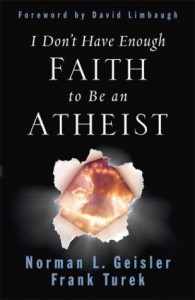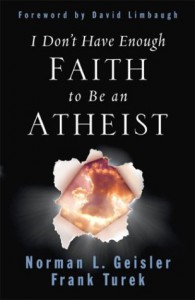Critiquing "I Don't Have Enough Faith to Be an Atheist" (Ch3, P1)
Since we all know how hard it is after a good, long holiday to get back into the swing of things, let's start this series's return to form by refreshing ourselves on where we are in I Don't Have Enough Faith to Be an Atheist's 12-point argument proving Christianity. Thus far we've learned:
1. Truth about reality is knowable. (Actually, we've shown it's impossible to know if this is true, but also that it doesn't matter, so Geisler and Turek are OK here.)
2. The opposite of true is false. (No argument from me!)
Leading us to their third assertion,
3. It is true the Theistic God exists, as evidenced by:
3a. the Cosmological Argument.
You're probably already familiar with the Cosmological Argument. If not, Geisler and Turek ably summarize this very old proposition (Plato and Aristotle were using it) on page 75, using the following syllogism:
_1. Everything that had a beginning had a cause.
The universe had a beginning.
Therefore the universe had a cause._
It goes without saying (but I'm going to say it anyway - I'm just that kind of person) that the "First Cause" which Geisler and Turek have in mind is God. Only at this identification do they actually part company with many atheists. Most nonbelievers today accept the validity of the C.A.'s conclusion, as well as the evidence Geisler and Turek use to support it.
Strictly speaking, this means I really shouldn't have any problems with this step of their argument, right?
Here's my dilemma. Technically, the answer is no. Geisler and Turek prove to my satisfaction the universe had a cause. Not only is their logic inescapable, but their proof at least seems undeniable to my eyes: the Second Law of Thermodynamics, the universe's constant expansion, the observation of radiation from the Big Bang, and Einstein's Theory of General Relativity all point to a beginning for our little reality.
But: while I don't mean to spoil anything for you here, the twelfth and final assertion which Geisler and Turek will make in I Don't Have Enough Faith... is this:
12. Therefore, it is true that the Bible is the Word of God (and anything opposed to it is false).
And if that's so, then all of the evidence Geisler and Turek use in this chapter is nullified; the great climax of their 12-point argument pulls its own feet out from under itself.
Because the Bible's account of Creation doesn't agree with the Big Bang Theory. Not at all. Even in the slightest.
IN THE BEGINNING
There is perhaps no story in the Bible as badly understood by modern readers as the Book of Genesis's tale of how our world was made.
This is in part a problem of education. For instance, when the very first verse in the Bible reads, "In the beginning God created the heavens and the earth" (NIV), the modern layperson should be forgiven for mistakenly thinking "the earth" refers to our planet or "the heavens" refers to God's kingdom above.
But the larger problem is that we are taught to take the account as the unvarnished truth. Since none of us can do this (accepting the text as it's written presents far too much difficulty for any educated adult today) but we also can't call the account untrue (most people have too much invested in the Bible being right to allow for its being wrong), we "rewrite" the story in our heads so as to lessen the cognitive dissonance we have to experience in order to agree with it.
Let's look again at the Bible's first verse, and add to it the second.
_1 In the beginning God created the heavens and the earth. 2 Now the earth was formless and empty, darkness was over the surface of the deep, and the Spirit of God was hovering over the waters... _
Taken completely literally, those verses already start raising questions for the modernist. If the earth was formless and empty, how is there water - especially "the deep"? But as a Christian, I didn't mind because I easily (and I thought, reasonably) paraphrased the verses in my head in such a way that the troublesome terms became metaphors. "In the beginning God created our universe and our world. Back then, Earth wasn't around. There was only the deep obsidian of starless Space. The Spirit of God hovered in this black 'ocean'."
Then I just completely ignored the fact that God never creates literal water in the story but is soon manipulating it and strangely putting storing some of it above a gigantic dome He calls "the sky". Like most believers, I was really pretty apathetic about the particulars, at least whenever they weren't under attack from skeptics, so my personal rationalization of the Creation Account didn't require much polish. I just needed to figure it out enough to believe it.
My view of the text has since changed primarily because one day I gave myself permission to not believe it if it didn't convince me, then set out to obtain an educated answer. It didn't take much investigation afterward to learn that the reason God doesn't create water in the Book of Genesis is because throughout the Middle East, it was once commonly held that water has always existed. "The lifeless waters of chaos" are the eternal, uncaused element in Sumerian, Babylonian, and Egyptian mythology. The task of the Creator(s) is always to master these waters and bring forth life in their midst. The Babylonian god Marduk, for instance, creates the world by killing the ocean goddess Tiamat and splitting her in half.
So assuming the Hebrews thought similarly to their neighbors, which is very likely considering both the text of Genesis and the influence those civilizations had on Israel and Judah, it's pretty easy to imagine the Bible's point of view on what the universe looked like before God created our "planet": just pretend you're underwater, and so deep there's absolutely no light by which to guide yourself.
The light problem, of course, is the first to be fixed by God.
3 And God said, “Let there be light,” and there was light.
4 God saw that the light was good, and he separated the light from the darkness.
5 God called the light “day,” and the darkness he called “night.” And there was evening, and there was morning—the first day.
Then God creates some space in which to work:
6 And God said, “Let there be a vault between the waters to separate water from water.”
7 So God made the vault and separated the water under the vault from the water above it. And it was so.
8 God called the vault “sky.” And there was evening, and there was morning—the second day.
And now the Bible has just defined the parameters of our world; ours is the place in the universe God has protected from water with an occasionally leaky dome.
9 And God said, “Let the water under the sky be gathered to one place, and let dry ground appear.” And it was so.
10 God called the dry ground “land,” and the gathered waters he called “seas.” And God saw that it was good.
The trick God pulls in verse 10 - bringing forth land out of water - is extremely important thematically for the rest of the Bible. When in the Book of Exodus a "sea of reeds" splits apart to allow God's people passage, God is applying His signature move, the power over water which identifies Him as the Creator. It's the ultimate expression of His divine authority and thus, a fitting finale for His war with the Egyptians.
But I'm in danger of digressing, probably because I like literature a lot more than I like science and philosophy a la carte.
Above is the proper interpretation of how the world began in the Bible, its plain meaning to anyone reading it without an emotional need to make it square with modern science. Geisler and Turek undoubtedly disagree, but they are wrong. Yet regardless, they haven't mentioned the Biblical story of Creation in this chapter, only the Cosmological Argument, with which I can't find any particular fault. So should I give them a pass?
If only for the sake of continuing this series, I suppose so - but more and more, I'm wondering if I'm justified in my suspicion that Geisler and Turek are basically trying to pull an "end run" here. Such a strategy would certainly square with their immature conception of philosophical argument in general.
If so, though, it won't work. Logic can't validate something that's self-evidently false, as many Biblical assertions are. When logic seems to do so, you've only proven your logic's faulty.
We'll conclude Chapter 3 next post.

